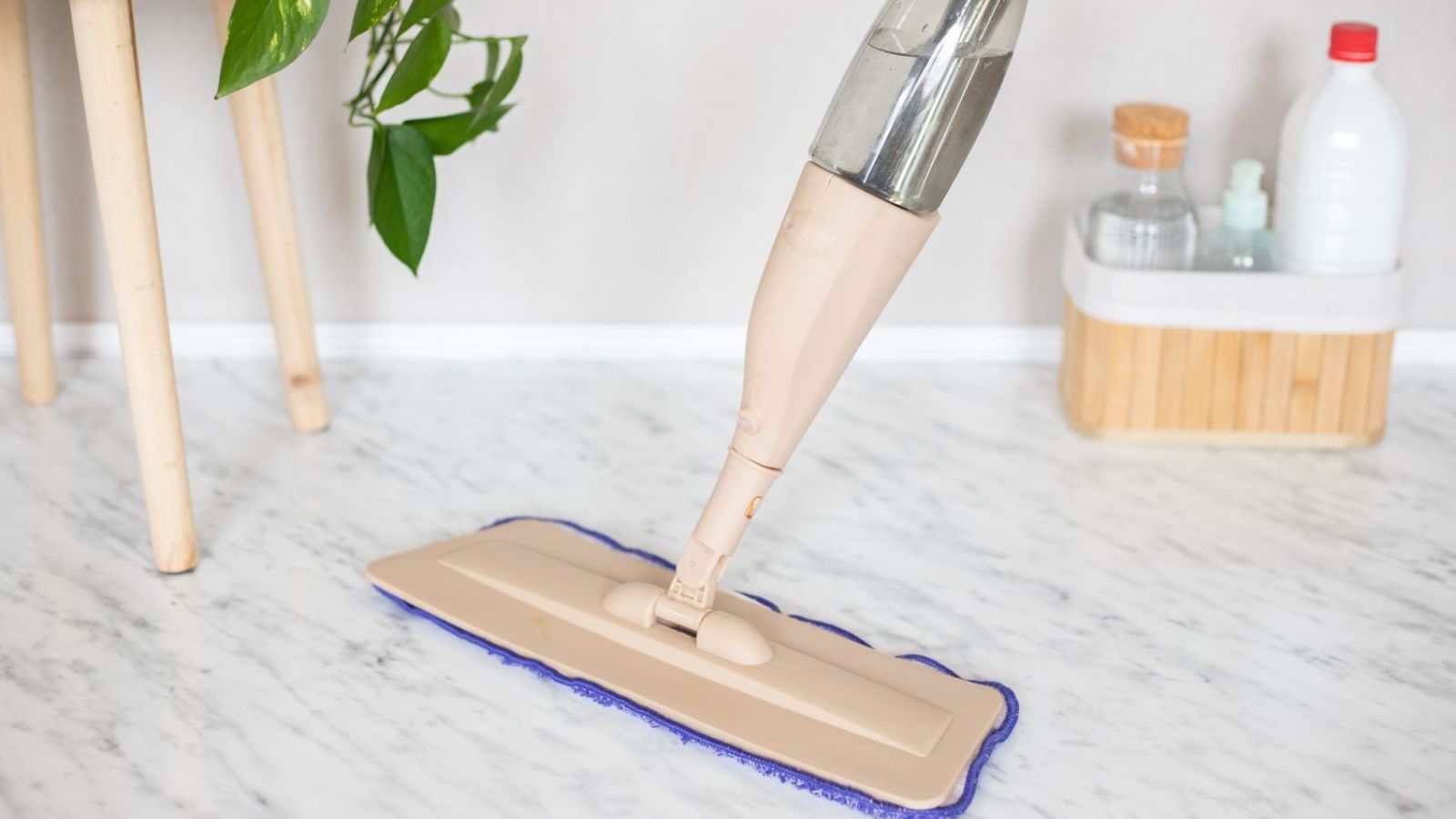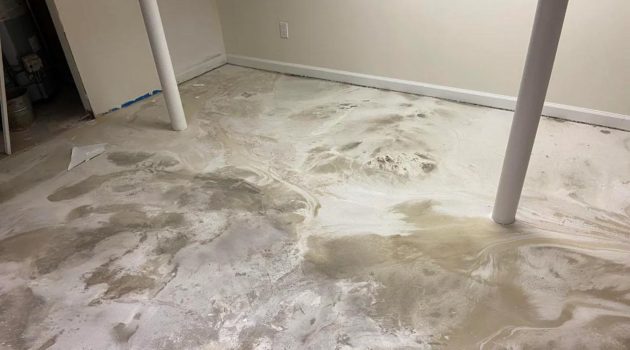Marble floors add a touch of elegance to any home, but if you’re a pet owner, accidents happen, and the distinct odor of urine can become an unwelcome companion to your stone surfaces.
Tackling urine smell on marble floors requires a careful approach, as the stone’s porous nature and sensitivity to acidic substances pose unique cleaning challenges.
The key to eliminating urine odor from marble floors is to address spills as soon as they happen, preventing the urine from seeping deep into the stone.
Quick action paired with the right cleaning methods can effectively remove odors without damaging your elegant flooring.
In dealing with established stains or lingering odors from past accidents, specific techniques and homemade solutions can be particularly useful in restoring your marble’s pristine condition and fresh scent.
1. Understanding Marble and Urine Interaction
Marble floors give your space a timeless elegance, but when urine comes into contact with this natural stone, it presents unique cleaning challenges.
Here, you’ll learn why urine affects marble and how to tackle those stubborn stains and odors.
Composition of Urine and Its Effect on Marble
Urine is a waste fluid produced by your body that contains water, urea, salts, and other compounds.
When it’s allowed to sit on marble surfaces, the acidic nature of urine can react with the calcium carbonate in marble.
This reaction may lead to etching, which appears as dull spots on the marble surface, and can also result in yellow staining and unpleasant odors.
- Acidity: Urine’s acidic pH can cause etching.
- Staining: The yellow color in urine can leave behind visible stains.
- Odor: Urea breaks down into ammonia, contributing to a strong smell.
Challenges in Removing Urine Stains and Odor
Urine stains and odors can be stubborn on marble floors because of the stone’s porosity, which allows liquids and odors to penetrate beneath the surface.
- Porosity: Marble’s pores absorb urine, making stains and odors harder to remove.
- Permanence: Over time, urine can cause permanent discoloration if not promptly addressed.
- Surface Damage: Acidic urine can damage the polished finish of marble, leading to costly repairs.
To mitigate these issues, it’s important to address urine spills as quickly as possible to prevent the substances in the urine from causing lasting damage to your lovely marble floors.
2. Immediate Response to Fresh Urine Spills
When you encounter fresh urine on your marble floors, taking swift and effective steps is crucial to prevent stains and persistent odors.
Blotting and Absorbing Liquids
First, absorb as much urine as possible. Using a clean, dry cloth or paper towel, gently blot the affected area.
Do not rub, as this can push the urine deeper into the marble. Be sure to cover the entire spot to lift off as much liquid as you can.
Neutralizing Odors with Immediate Home Remedies
Immediately after blotting, you can use simple home remedies to neutralize any lingering smells. Here are two effective options:
Baking Soda:
- Sprinkle a generous amount of baking soda directly onto the area.
- Allow it to sit for 15 minutes to absorb and neutralize the odor.
- Vacuum or sweep away the baking soda.
White Vinegar Solution:
- Mix a solution of 50% water and 50% white vinegar in a spray bottle.
- Spray the solution onto the affected spot without saturating the marble.
- Let it stand for 5-10 minutes and then wipe it up with a clean, damp cloth.
- Remember to use these remedies promptly for best results in keeping your marble floors clean and odor-free.
3. Deep Cleaning for Persistent Stains and Odors
When you’re dealing with persistent urine stains and odors on marble floors, it’s crucial to choose the right cleaning solutions that are both effective and safe for the stone.
Choosing the Right Cleaner for Marble Floors
Your marble deserves a gentle yet effective cleaner. Acidic cleaners can damage marble, so it’s important to avoid vinegar and citrus-based cleaners.
Opt for pH-neutral substances specifically designed for use on marble. These cleaners will help remove stains and odors without harming the delicate surface.
Utilizing Enzymatic Cleaners to Break Down Bacteria
Enzymatic cleaners are your go-to for combating odor-causing bacteria in urine stains.
These cleaners use natural enzymes to break down the bacteria in urine, effectively neutralizing odors at the source. Apply the enzymatic cleaner following the product instructions, usually by:
- Applying the cleaner to the stained area.
- Allowing it to sit for the specified time to let the enzymes work.
- Gently wiping away any residue.
Note: Always perform a spot test in an inconspicuous area to ensure the cleaner does not discolor or damage the marble.
Homemade Solutions and Their Applications
If you prefer homemade solutions, hydrogen peroxide can be your ally, especially for light-colored marble.
Mix a solution of hydrogen peroxide with water at a 50:50 ratio and apply it directly to the stain. However, be cautious with darker marble as hydrogen peroxide might lighten the stone.
For a homemade cleaning paste:
- Mix baking soda with water to create a thick paste.
- Apply this to the stain, cover with plastic wrap, and leave overnight.
- Rinse thoroughly with water.
The cleaning process for marble requires patience and gentle handling. By following these guidelines, you can tackle those stubborn stains and odors without resorting to harsh chemicals.
4. Preventive Measures and Maintenance Tips
Marble floors bring elegance to any home, but keeping them pristine requires consistent care. Here are some focused strategies on how to maintain your marble flooring.
Regular Cleaning and Polishing Routines
To prevent urine smell and maintain the shine of your marble floor, establish a routine cleaning schedule.
Always use a neutral pH cleaning product; acidic or alkaline products can damage the stone. For daily cleaning:
- Sweep or dust mop your floors to remove dirt particles.
- Use a soft mop and a marble floor cleaner for a deeper clean.
- Dry the floor with a soft cloth to avoid water spots.
Sealing Marble to Protect from Future Spills
Seal your marble floor periodically to safeguard against stains and etching. The sealer creates a protective barrier, making it easier to clean spills before they penetrate the surface. Here’s what to do:
- Choose a high-quality marble sealer.
- Apply according to the manufacturer’s instructions, ensuring full coverage.
- Reapply the sealer every six months to a year, or as recommended.
When to Consider Professional Help or Replacement
While you can handle everyday cleaning and maintenance, some scenarios may call for professional assistance:
- If sealing or cleaning does not remove the urine odor, consult a marble restoration professional.
- When the marble is repeatedly stained or becomes dull even after polishing, consider having a professional repolish the surface.
- If the marble is severely damaged or the finish is beyond recovery, it might be time to replace the affected tiles with brand new ones.



